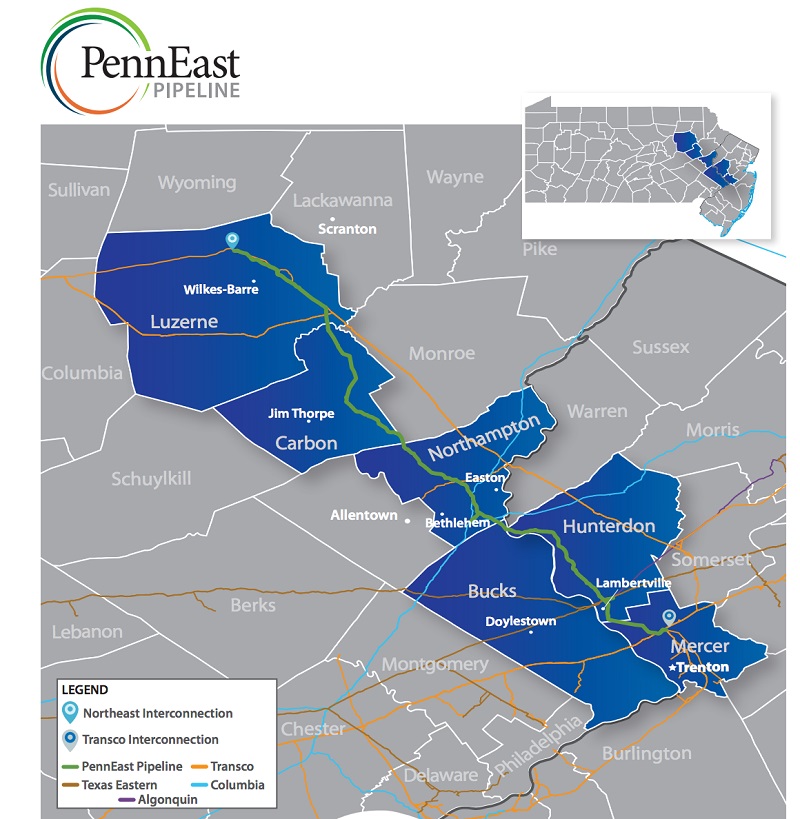Supreme Court to Hear Pipeline Company's Bid to Seize New Jersey Land
WASHINGTON (Reuters) — The U.S. Supreme Court on Wednesday agreed to hear a bid by a consortium of energy companies seeking to seize land owned by the state of New Jersey to build a $1 billion natural gas pipeline.
The justices agreed to take up an appeal by PennEast Pipeline Company LLC, a joint venture backed by energy companies including Enbridge Inc, of a lower court ruling in favor of New Jersey's government, which opposed the land seizure.
Other companies in the consortium for the 120-mile (190-km) pipeline from Pennsylvania to New Jersey include South Jersey Industries Inc, New Jersey Resources Corp (NJR), Southern Co and UGI Corp.
At issue in the case is a 1938 U.S. law called the Natural Gas Act that allows private energy companies to seize "necessary" parcels of land for a project if they have obtained a certificate from the Federal Energy Regulatory Commission.
FERC in 2018 approved PennEast's request to build the pipeline. The company promptly sued in federal court under the Natural Gas Act to use the federal government's eminent domain power to gain access to properties along the route.
New Jersey opposed construction of the pipeline and did not consent to PennEast's seizure of properties the state owns or in which it has an interest.
PennEast wants the land to build the pipeline, which is designed to deliver 1.1 billion cubic feet per day of gas - enough to supply about 5 million homes - from the Marcellus shale formation in Pennsylvania to customers in Pennsylvania and New Jersey.
The Philadelphia-based 3rd U.S. Circuit Court of Appeals ruled in 2019 that PennEast could not use federal eminent domain to condemn land controlled by the state.
Consumer Energy Alliance applauded the Supreme Court’s decision to hear the arguments in a statement to the media.
“This is a major step toward settling whether states can arbitrarily override settled and established federal laws that govern energy infrastructure and more importantly, interstate commerce,” Consumer Energy Alliance President David Holt said in the statement. “That principle has served our nation well in easing the constant tension between states and the federal government, and ensuring that no single state can put its interests above those of its neighbors or the country.”
The alliance previously submitted a “friend of the court” amicus brief on behalf of PennEast project, expressing concern that a Third Circuit decision would create confusion about the process of approving much-needed energy infrastructure projects and threaten the future of America’s energy reliability, supply and environmental progress, and lead to higher energy costs for consumers, according to the statement.
Related News
Related News

- Kinder Morgan Proposes 290-Mile Gas Pipeline Expansion Spanning Three States
- Enbridge Plans 86-Mile Pipeline Expansion, Bringing 850 Workers to Northern B.C.
- Intensity, Rainbow Energy to Build 344-Mile Gas Pipeline Across North Dakota
- U.S. Moves to Block Enterprise Products’ Exports to China Over Security Risk
- Court Ruling Allows MVP’s $500 Million Southgate Pipeline Extension to Proceed
- U.S. Pipeline Expansion to Add 99 Bcf/d, Mostly for LNG Export, Report Finds
- A Systematic Approach To Ensuring Pipeline Integrity
- 275-Mile Texas-to-Oklahoma Gas Pipeline Enters Open Season
- LNG Canada Start-Up Fails to Lift Gas Prices Amid Supply Glut
- Kinder Morgan Gas Volumes Climb as Power, LNG Demand Boost Pipeline Business





Comments